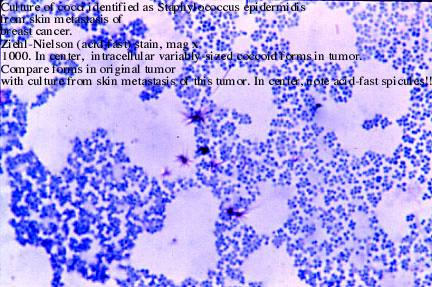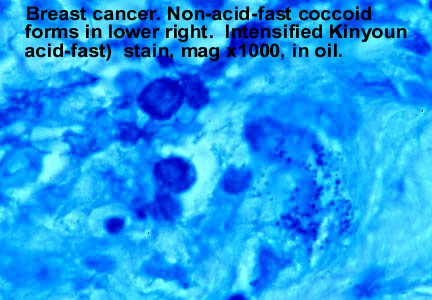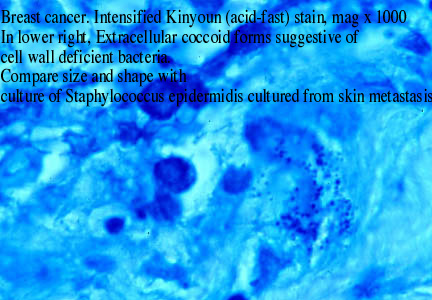- To Jennie Burke
- Sydney, Australia
-
- Hi Jennie -
-
- Drat!!
-
- Your mycoplasma research in breast cancer would have
made a good report!!!!
-
- Please try and confirm the presence of CELL-WALL DEFICIENT
BACTERIA (i.e. mycoplasma) in breast cancer --they are the SIZE of TINY
STAPHYLOCCI --- by asking the pathologist to stain a few of his breast
cancer sections with an acid-fast stain. I am sure if you study the sections
CAREFULLY and USING THE OIL IMMERSION lens -- you will find these tiny
bacteria --- just as I reported in the medical literature years ago.
-
- They look like the three photos below (Staphylococcus
epidermidis was cultured from the skin metastasis)
-
- Regards,
- Alan
-
- PS: Please forward to other persons interested in bacteria
as a CAUSE of breast cancer. This research urgently needs CONFIRMATION/RECOGNITION
by others to help fight this devastating disease in women.
-
- J Dermatol Surg Oncol. 1981 Jun;7(6):483-91.
- Related Articles, Links
-
- Microbial findings in cancers of the breast and in their
metastases to the skin. Implications for etiology.
-
- Cantwell AR Jr, Kelso DW.
-
- In four cases of carcinoma of the breast, variably acid-fast
coccoid forms were found in sections from their metastases to the skin
and in one of these cases in sections of the primary carcinoma. In this
one case, similar-appearing corcoid forms were observed within the sections
of the primary malignancy. In this same case, Staphylococcus epidermidis
was cultured and studied at once and as it aged for development of forms
comparable to those found in the microscopic sections of the neoplastic
process. The implications of the findings for etiology of carcinoma of
the breast are discussed.
-
-
-

-
-
-

-
-

-
-
-
-
-
- On Sep 22, 2005, at 7:38 PM, Jennie Burke wrote:
-
- Dear Marinza,
-
- I'd like to be kept informed if you do manage to get
some research going. We looked at the presence of mycoplasma in breast
cancer patients a while ago, where we used PCR methods to test women diagnosed
but who had had no 'treatment'. We chose those as we did not want anyone
to be able to say they were positive because they were immune depressed
due to treatment.
-
- We got just over 50% positive for myco. I couldn't publish
however, because the scientific officer running that section for me threw
out the samples (and one must hold them at least till after publication).
-
- At some stage I'd like to repeat the process and then
publish.
-
- There have been some very large Chinese studies looking
at myco;s in cancer, but as far as I know, no-one has looked at what happens
if the infection is treated at early diagnosis. Of course there is also
the propensity that myco has for cancer cell lines. One wonders why the
common contaminent is myco and not fungi. anyway it would be good to stay
in touch
-
- Regards
- Jennie Burke
-
- -----Original Message-----
-
- From: Marinza
- Sent: Saturday, 24 July 2004
- To: Alan Cantwell, etc
- Subject: Important article re "cancer microbe"
research by Douglas H Robinson
-
- Thanks for this.
-
- http://www.patientfocus.org would like to pursue research
in bacteria in connection with cancer. It's a tough one, but it needs to
be done. Anyone who wants to collaborate, please get in touch with me to
help me with ways to get it going again; suggestions, contacts, anything.
Beauchamp's book 'The Blood and its Third Element' is a somewhat tough
read (perhaps due to the translation) but it is a definite must-read to
understand why we have made so little progress in cancer control.
-
- Highly recommended, along with Barry Lynes' book 'The
Cancer Cure that worked, 50 years of suppression'. And of course, Dr. Cantwell's
book, 'The Cancer Microbe.' (thanks, Alan, for recommending these books
to me). -m.
-
- -----Original Message-----
-
- From: Alan Cantwell
- Sent: Wednesday, July 21
-
- To interested readers -
-
- This is a tough read to the uninitiated but has important
findings related to the "genetics" and "molecular biology"
of bacteria derived from cancer -- and their possible origin from human
cells (this is reminiscent of Wilhelm Reich's work with cancer "T
bacilli" and "bions."
-
- I hope you all can open the downloadable PDF --- if not,
contact Douglas.
- Remember that "procaryotes" refer to bacteria
-- and "eukaryotes" or "eukaryotic" cells refer to
those of animals (humans) , plants, and fungi -- these cells contain a
nucleus.
-
- I will also forward some personal correspondence from
me to Doug. I do think Doug's paper is a terrific contribution to the cancer
microbe work.
-
- Regards,
- Alan
-
- Begin forwarded message:
-
- From: "Robinson, Doug"
- Date: July 21, 2004 6:14:30 AM PDT
- To: "'Alan Cantwell'"
- alancantwell@sbcglobal.net
- Subject: RE: Multicellularity of Mammalian Tumor-derived
Bacteria
-
- Alan,
-
- Here's another go at sending the PDF of the article.
The article is in press and online at the publication web site. I do not
know when it will be available in print. Please let me know if you do not
receive a complete downloadable PDF.
-
- Thanks for your swift reply. All along, I've suspected
there is something up with this "cancer bacteria" thing - it's
just been difficult for the (tiny) cancer bacteria research community to
make a connection with the larger scientific community. Tumor-derived bacteria
that possess distinct multicellular mammalian eukaryotic-like properties,
unlike other known "contaminant" species (How many times have
you heard that argument?) may be key in making a novel evolutionary link
that the larger scientific community will be unable to ignore.
-
- We'll see if they become interested in this anomaly.
I do know that current molecular biology approaches to understanding and
solving the cancer problem have not done the trick - and are unlikely to
do so alone if cancer represents an evolutionary phenomenon at the cellular
and organismal levels.
-
- When you have a chance, look into Bechamp's work. I think
there's a connection with my work.
-
- Best regards,
-
- Doug
-
- -----Original Message-----
-
- From: Alan Cantwell
- Sent: Tuesday, July 20, 2004
- To: Doug Robinson
- Subject: Multicellularity of Mammalian Tumor-derived
Bacteria
-
- Dear Doug:
-
- If you send me the complete file of this article, I would
like to send it to other interested parties.
-
- Please also note the date/volume of Journal publication
for reference purposes.
-
- regards,
-
- Alan
-
-
- On Jul 20, 2004, at 7:27 AM, Robinson, Doug wrote:
-
- Dear Alan,
-
- I have attached a recently published article for your
review.
-
- Best regards,
- D.H. Robinson
- douglas.robinson@denovobiologic.com
-
- deNovoarticle.pdf
-
-
- Alan Cantwell M.D.
- alancantwell@sbcglobal.net
- http://www.ariesrisingpress.com
-
- FOUR WOMEN AGAINST CANCER
-
-
- From Alan Cantwell
- alancantwell@sbcglobal.net
- 9-26-5
-
- Mr L Martinez:
-
- Did you read the article in the Los Angeles Times????
These are not my conclusions but the Times author and the LA coroner's.
Of course, you are free to ignore or disregard them.
-
- The Times article (not me) clearly states the cause of
the child's death was AIDS:
-
- "The cause, according to a Sept. 15 report by the
Los Angeles County coroner, was AIDS-related pneumonia."
-
- You are certainly welcome to your opinion re HIV, but
I happen to take infection from that virus and its consequences seriously.
And it is indeed unfortunate that Ms Maggiore did not - nor did the pediatricians
who treated the child. I personally think this is a tragedy that MIGHT
have been prevented if Ms M had recognized the seriousness of her own HIV
infection and its potential threat to her daughter. And she did NOT.
-
- Alan Cantwell M.D.
-
-
- On Sep 26, 2005, at 3:21 PM,
- 17thalesxxx@cox.net wrote:
-
- Dr. Cantwell,
-
- Your commentary about Ms. Maggiore's child was incredibly
irresponsible and unethical. Ms. Maggiores' child was healthy shortly before
her death and there is no confirmation that her baby died of anything related
to AIDS as per the question mark accompanying the article. To make such
an unfounded accusation when a woman is in mourning is unconscionable and
inexcusable
-
- The bigger question would be why the medical profession
would choose to believe that HIV causes AIDS when that issue has already
been debunked by Dr. Duesberg and others? Have you read the original papers
that Dr. Gallo based whis claims on? I have and I can guarantee you that
they don't even come close to proving that H.I.V. causes AIDS. Even the
claim of that the AIDS diseases are caused by immune suppression is highly
dubious. The signature disease of AIDS, Kaposi Sarcoma, is now believed
to be completely unrelated to H.I.V. This acknowledgement came after the
C.D.C. claimed it had killed more than 30 % of AIDS patients at one time.
The AIDS tests themselves have been discredited as unreliable as well.
-
- Normally, I would not send unsolicited e-mail to someone,
but you listed your address and your comments and the accompanying article
were absolutely outrageous. I wish all of the "doctors" involved
with AIDS take a really good long look at the history and arguments surrounding
H.I.V. They don't hold water as you will soon find out.
-
- Mr. L. Martinez
-
-
- Alan Cantwell M.D.
- alancantwell@sbcglobal.net
- http://www.ariesrisingpress.com
- FOUR WOMEN AGAINST CANCER
|